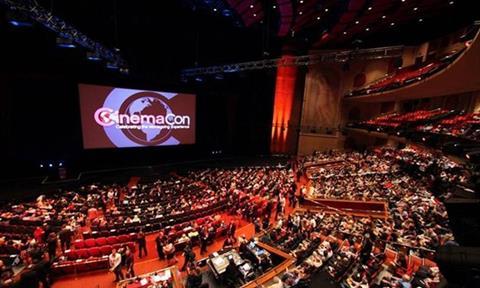
NATO (National Association Of Theatre Owners) head John Fithian asserted the importance of theatrical windows and told CinemaCon attendees on Tuesday (April 26), “I am pleased to announce that simultaneous release is dead as a serious business model and piracy is what killed it.”
Explaining that when films go online and spread they have “a very damaging impact on our industry” Fithian was willing to concede that exhibition and distribution continued to collaborate on “evolving periods of theatrical exclusivity” that increased value when the films debut on streaming platforms. “It remains the case that theatrical windows grow our entire industry.”
The NATO president and CEO’s comments came hours after Warner Bros Discovery CEO David Zaslav, talking to analysts, pledged his commitment to exclusive theatrical windows in the newly merged company’s first earnings report. Zaslav also said he would not overspend on content.
Prior to Fithian’s remarks at the Colosseum in Caesars Palace, Las Vegas, Motion Picture Association (MPA) chairman and CEO Charles Rivkin too devoted much of his CinemaCon opening addresses to the “existential threat” of piracy, but not before he referenced $1bn+ North American theatrical box office in the first quarter fuelled by Spider-Man: No Way Home, The Batman and The Lost City, and the recent THEME report that highlighted the $99.7bn global theatrical, home and mobile entertainment market which marked a 24% increase against 2020.
On piracy Rivkin noted how organised crime was behind “sophisticated and nimble” global operation that reguired an “equally powerful response”.
The MPA head said he was encouraged by the response which has resulted in arrest around the world. The organisation set up ACE (Alliance for Creativity and Entertainment), a coalition of the US majors and companies like Apple TV+, BBC and Canal+. The MPA’s chief content protection officers heads a team of more than 100 working with Interpol and other law enforcement.
The MPA’s measures range from the “nice to perhaps the not-so-nice” as it deploys in-person cease and desist operations where illegal operators are approached and told to stop; voluntary initiatives with intermediaries in the global supply chain like payment and social media companies; filing civil cases around the world; and building criminal cases that are sent to bodies like Interpol.
A partnership with Google has removed 10,000 illegal domains from search results across 10 countries. In North America the MPA’s anti-piracy campaign has reduced that number of illegal websites and streaming subscription services from 1,400 in 2019 to about 200. “We’re making a difference,” Rivkin said.
“For us to have any kind of meaningful impact,” he added, “many things must continue to fall into place, including working with governments around the world to expand our pirate site-blocking efforts, and more broadly, driving a sea change in the consumer culture that understands why piracy harms us all.”

























No comments yet